

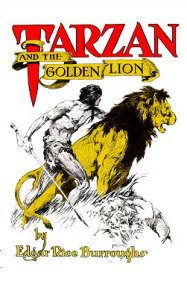

PULP
Argosy All-Story Weekly: 1922: December 9, 16, 23, 30; 1923: January
6, 13, 20
P.J. Monahan: December 9 cover
~ Stout: one b/w interior in each installment ~ editor Davis: Foreword
FIRST EDITION
A.C. McClurg: March 24, 1923 ~ 333 pages
J. Allen St. John:
DJ and eight interior plates
REPRINT EDITIONS
Grosset & Dunlap: 1924 (two printings) ~ 333 pages
Grosset & Dunlap Photoplay movie edition: 1927 and 1929
James Pierce: photo DJ and four
b/w interior photos
Grosset & Dunlap photoplay: 1930 and 1931 editions ~ St.
John DJ and eight b/w interior plates
Grosset & Dunlap: 1940 ~ St. John DJ but no interiors
Grosset & Dunlap Madison Square wartime edition: 1943 ~ 332
pages
J. Allen St. John: DJ and title
page logo
Big Little Book Whitman Publishing: 1943 ~ 432 pages
John Coleman Burroughs cover ~
Rex Maxon: 209 interiors adapted from 1930-31 daily strips
Grosset & Dunlap: July 1949 ~ 332 pages
C. Edmund Monroe: DJ ~ Rafael Palacios:
Africa map on endpapers and decorated title page
Ballantine paperback: July 1963 ~ 191 pages
Richard Powers cover
Grosset & Dunlap: 1967 ~ 332 pages
C. Edmund Monroe: pictorial boards
cover using previous DJ art ~ decorated title page
Ballantine paperback: October 1969
Robert Abbett cover
Ballantine paperback: November 1976
Boris Vallejo cover
Del Rey-Ballantine Double paperback: May 1997 ~ 426 pages ~
with Tarzan and the Ant Men
Charles Keegan cover
| Edgar Rice Burroughs'
Tarzan and the Golden Lion Chapters I.The Golden Lion
|
CAST (in order of appearance)
Tarzan of the apes: John Clayton, Lord Greystoke Jane Clayton: Lady Greystoke, wife of Tarzan Korak: Jack Clayton, son of Tarzan and Jane Jad-bal-ja the Golden Lion: Tarzan's pet/companion Umanga: a village chief Za: Umanga's bitch recruited to nurse Jad-bal-ja Muviro: old chief of Tarzan's Waziri warriors Jervis: English foreman of Tarzan's African estate Flora Hawkes: one-time London maid to Jane Clayton Esteban Miranda: Spanish actor, Tarzan look-alike John Peebles: English pugilist and ne'er-do-well Dick Throck: English pugilist and ne'er-do-well Adolph Bluber: Fat German, treasurer of badguys expedition Carl Kraski: Russian dancer, chief badguy Gobo: ape killed by Esteban Pagth: king of Gobu's tribe Keewazi: black who let Jad-bal-ja escape Manu: little monkey gossiper near Opar Cadj: High Priest of the Flaming God of Opar Blagh: guard at Opar La: High Priestess and Queen of Opar Dooth: a priest of Opar, loyal to La Oah: a priest of Opar, loyal to Cadj Usula: one of Tarzan's Waziri warriors Owaza: a village headman Old Man: un-named English prisoner of the Bolgani: Luviri Owaza's second in command Obebe: a cannibal Cast List Ref: Clark A. Brady's Burroughs
Cyclopedia and Ed
Stephan's Tarzan of the
Internet
|
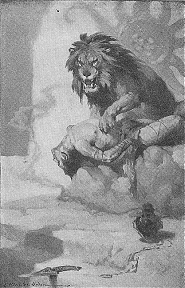

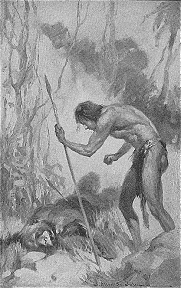
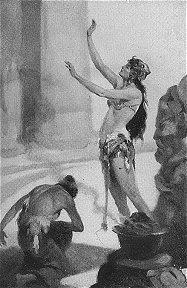
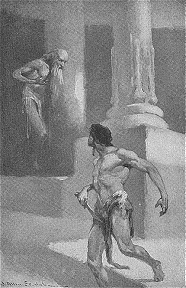
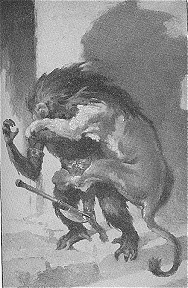
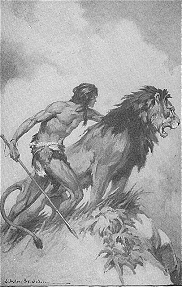
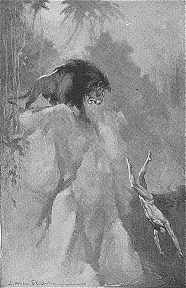

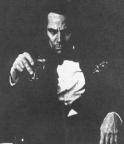
From 1923, where it first appeared as a seven-part serial in ARGOSY ALL-STORY WEEKLY beginning in December 1922, this is one of the books from (in my opinion) Tarzan`s best period. From roughly TARZAN AND THE JEWELS OF OPAR to TARZAN AND THE ANT MEN, Burroughs had developed his writing style into something clear and flexible, while keeping the dignified formality of his earliest work. His concept of Tarzan as a complex man with a fully realized supporting cast was in full use, things which would be sorely missed in the second half of the series. And he had not yet become as bitter and filled with dislike of humanity in this period as he later showed.
TARZAN AND THE GOLDEN LION neatly juggles several different plot threads and ties them together (with perhaps a heavy glue of coincidence) into a very entertaining book. There is the introduction of Jad-Bal-Ja, the golden lion himself, but as imposing a presence as he is, he`s not the main focus of the book. For the most part, the story follows a trip by Tarzan back to Opar for some boodle and then to the nearby odd civilization of the Palace of Diamonds. Meanwhile, a vile crew of assorted rogues are also headed for Opar to snatch some of that treasure, among them the Greystoke`s former maid and a Spaniard named Esteban Miranda, who looks so much like Tarzan that he fools even Muviro and the Waziri in daylight. (What are the odds of that, eh?)
There are many fascinating details in this book which show that, in his prime,. Edgar Rice Burroughs had a wild imagination and a gift of presenting his creations vividly. Opar remains his best conceived and developed lost city, but he introduces something here nearly as intriguing. Not far from Opar and related to it is a vast castle literally studded with diamonds set in gold. Instead of the gnarled Neanderthalish Oparians, though, it`s inhabited by a race of speaking gorillas, who wear jewelry and girdled loinclothes and keep a brutish clan of natives as downtrodden slaves. There`s a tangled genetic mess here, all right. The goons of Opar have interbred with apes enough that they not only look pretty darn simian, they can speak the ape language and even understand the nagging of Manu the monkey. In contrast, the Bolgani look just like rather large and unsavory gorillas but they walk upright without leaning on their knuckles and they have human level intelligence. Perhaps they were originally elevated by the ancient Atlantean founders of the colony to serve as guards and laborers. (Is it just barely possible that Michael Crichton had read this book before writing CONGO?)
One thing I like about this book is that Tarzan is genuinely heroic in the chivalrous sense. In the later books, he became indifferent to human suffering and lost himself in an indolent daydream unless hungry or attacked. But in this middle period, he has claimed a large territory as his personal domain and he enforces the peace in it with vigor. Slavery, torture, cannibalism...are are forbidden in Tarzan`s turf and you`d better not let him catch you at it or even enter his domain without permission. Here he immediately is offended as the brutal mistreatment of the black slaves by the Bolgani and he resolves to free the humans and establish justice in this area.
Tarzan`s supporting cast is also very welcome in these medium period books. Jane is brave, admirable and as heroic in her own right as her husband. Their son Korak is not seen as much and wife Meriem is oddly absent, but then young Jack Clayton had enjoyed a dramatic role in the previous book, TARZAN THE TERRIBLE. And the Waziri tribesmen are repeatedly described as the bravest and most competent warriors in Africa, if a bit bloodthirsty and eager for a fight. They are "clean-cut, powerful men, with intelligent faces and well molded features.." Their loyalty to Tarzan and Jane might seem a bit overdone to touch modern sensibilities, but after all the Apeman was their chief and blood brother and it would be a wise fighter who accepted Tarzan as a leader. My delicate sweetie La also appears, still hopelessly lusting for Tarzan, exiling herself to save him from sacrifice and still strutting about nearly naked; she doesn`t seem quite as murderous or memorable as in her other appearances, though.
As for Jad-Bal-Ja himself, well what can I say? He`s an impressive character on the stage. Rescued as a cub and raised painstakingly by Tarzan himself, the golden lion grows into a huge blackmaned beauty. Probably only Tarzan could have trained a lion to follow spoken commands, to fetch and heel. Wnat rings most true is that, however well trained he is, Jad-Bal-Ja always stays more than a bit unruly and unpredictable and even Tarzan has trouble reining him in against his natural impulses. He certainly gets a workout too, plowing his way through a full scale battle and leaving raw piles of chewed Bolgani all over the place.
This is my favorite characterization of Tarzan himself. He has enough sophistication to tease Jane that perhaps his father was in fact an ape ("...you know Kala always insisted that he was"), and there are referennce to his sitting in the House of Lords and enjoying a late cup of coffee "upon his return from the theatre or a ball." This is the same man who is enthusiastic about dropping from a tree to kill an antelope with his knife and, in this story, hoisting a full grown gorilla to his shoulders and carrying the carcass around with him. It`s the duality of Tarzan that makes him unique. Although he might prefer to lived naked in the trees and eat raw meat all the time, his genuine love for Jane has led him to develop a huge plantation and ranch, with a comfortable bungalow for a home. I don`t think this is entirtely for Jane`s sake, either. Tarzan always has to be the alpha male, the Big Bwana, chief of his tribe whether ape or Waziri. He supervises his estate carefully and also enforces his self-imposed rule on the territory around him.
For all of his (and the author`s) sermons against civilization, Tarzan seems determined to bring basic law and order even to tribes which don`t affect him directly. Within three or four books later, the Apeman would essentially forget his family and responsibilities and escape to a simpler childhood`s fantasy of no schedule and no decisions to make. He was less interesting as the wandering solitary savage, with only Nkima and occasionally his pet lion, than he was as the literal Lord of the Jungle.
|
ERB C.H.A.S.E.R. Online Encyclopedia Hillman ERB Cosmos Patrick Ewing's First Edition Determinors John Coleman Burroughs Tribute ERBList Summary Project by David Adams J. Allen St. John Bio, Gallery & Links Edgar Rice Burroughs: LifeLine Biography Bob Zeuschner's ERB Bibliography J.G. Huckenpohler's ERB Checklist Burroughs Bibliophiles Bulletin |
Bruce Wood's ERB Jacket Store Ed Stephan's Tarzan of the Internet Nick Knowles' ERB Paperback Collector Illustrated Bibliography of ERB Pulp Magazines Phil Normand's Recoverings ERBzin-e Weekly Online Fanzine ERB Emporium: Collectibles ~ Comics ~ BLBs ~ Pulps ~ Cards ERBVILLE: ERB Public Domain Stories in PDF Clark A. Brady's Burroughs Cyclopedia Heins' Golden Anniversary Bibliography of Edgar Rice Burroughs Bradford M. Day's Edgar Rice Burroughs: A Bibliography |
|
Links to over 2,000 of our sites |
Weekly Online Fanzine |
Online Encyclopedia |
Web Museum |